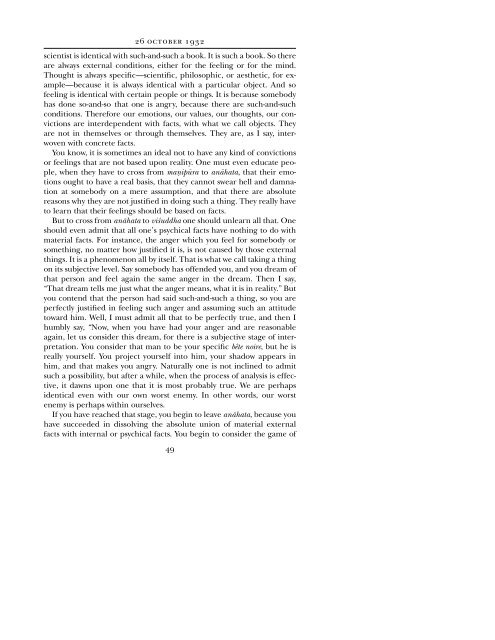CG JUNG - Countryside Anarchist
CG JUNG - Countryside Anarchist
CG JUNG - Countryside Anarchist
Create successful ePaper yourself
Turn your PDF publications into a flip-book with our unique Google optimized e-Paper software.
26 OCTOBER 1932<br />
scientist is identical with such-and-such a book. It is such a book. So there<br />
are always external conditions, either for the feeling or for the mind.<br />
Thought is always specific—scientific, philosophic, or aesthetic, for example—because<br />
it is always identical with a particular object. And so<br />
feeling is identical with certain people or things. It is because somebody<br />
has done so-and-so that one is angry, because there are such-and-such<br />
conditions. Therefore our emotions, our values, our thoughts, our convictions<br />
are interdependent with facts, with what we call objects. They<br />
are not in themselves or through themselves. They are, as I say, interwoven<br />
with concrete facts.<br />
You know, it is sometimes an ideal not to have any kind of convictions<br />
or feelings that are not based upon reality. One must even educate people,<br />
when they have to cross from maõipÖra to anvhata, that their emotions<br />
ought to have a real basis, that they cannot swear hell and damnation<br />
at somebody on a mere assumption, and that there are absolute<br />
reasons why they are not justified in doing such a thing. They really have<br />
to learn that their feelings should be based on facts.<br />
But to cross from anvhata to viçuddha one should unlearn all that. One<br />
should even admit that all one’s psychical facts have nothing to do with<br />
material facts. For instance, the anger which you feel for somebody or<br />
something, no matter how justified it is, is not caused by those external<br />
things. It is a phenomenon all by itself. That is what we call taking a thing<br />
on its subjective level. Say somebody has offended you, and you dream of<br />
that person and feel again the same anger in the dream. Then I say,<br />
“That dream tells me just what the anger means, what it is in reality.” But<br />
you contend that the person had said such-and-such a thing, so you are<br />
perfectly justified in feeling such anger and assuming such an attitude<br />
toward him. Well, I must admit all that to be perfectly true, and then I<br />
humbly say, “Now, when you have had your anger and are reasonable<br />
again, let us consider this dream, for there is a subjective stage of interpretation.<br />
You consider that man to be your specific bête noire, but he is<br />
really yourself. You project yourself into him, your shadow appears in<br />
him, and that makes you angry. Naturally one is not inclined to admit<br />
such a possibility, but after a while, when the process of analysis is effective,<br />
it dawns upon one that it is most probably true. We are perhaps<br />
identical even with our own worst enemy. In other words, our worst<br />
enemy is perhaps within ourselves.<br />
If you have reached that stage, you begin to leave anvhata, because you<br />
have succeeded in dissolving the absolute union of material external<br />
facts with internal or psychical facts. You begin to consider the game of<br />
49


